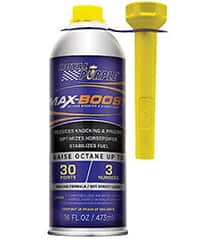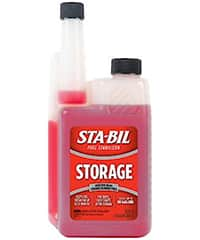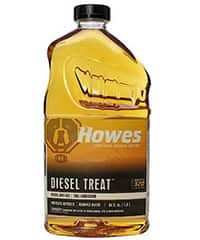You may be wondering if fuel additives are a good option for your vehicle. After all, the Environmental Protection Agency (EPA) requires that all fuel sold in the U.S. contain a minimum amount of deposit-control additives to prevent a dangerous buildup in car systems. Isn't that enough? Well, it depends. There are benefits to using fuel additives, depending on your vehicle’s specific needs. Read on to learn how to choose the right type.
What are fuel additives?
One point of confusion over fuel additives comes from the baffling array of available products. There are many types of fuel additives, and they aren't one-size-fits-all, with each additive relieving a different pain point.
Fuel additives generally fall into two categories: stabilizers and enhancers. Fuel stabilizers are meant to be used when you won’t be operating the engine for a while, such as during winter months. Enhancers, on the other hand, are intended to be beneficial when the engine is in use. We’re going to cover all of them below.
Types of fuel additives
1. Fuel injector cleaners
Over time, fuel injectors and the rest of the fuel system can become gummed up. Fuel injector cleaners contain detergents that help clear out the system, leading to smoother operation all around. If you’re experiencing sluggish acceleration or reduced performance, using a fuel injector cleaner is an easy and affordable first step to take.
Look for fuel additives that contain polybutene amine (PBA), which can clean out deposits from carburetors, fuel injectors and intake valves.
2. Octane boosters
As their name implies, octane boosters are designed to increase fuel's octane rating. However, octane rating does not directly translate to power. Rather, octane is important in creating a stable environment for combustion to occur. If your engine is experiencing problems like pinging or knocking as the result of incomplete combustion, using an octane booster can be beneficial.
3. Fuel stabilizers
Fuel stabilizers are great for anything with an engine, from your car or truck to the lawnmower. They’re designed to prevent fuel from breaking down over time, which can lead to hard starts. Consider using a fuel stabilizer if you know you won’t be driving for a couple of months or as part of your winterizing process on boats, ATVs and lawnmowers. You’ll thank yourself later!
4. Anti-gel diesel additives
Diesel fuel has some real benefits, but it struggles in winter. When temperatures drop, diesel fuel will start to gel, causing blockages in the filter, hard starts and potentially expensive engine damage. Anti-gel additives like the Howes Diesel Treatment Conditioner and Anti-Gel are designed to unclog diesel fuel filters and reduce hard starting during low temperatures. We recommend you take this preventative measure as soon as temperatures approach freezing. Follow the instructions on the bottle to determine the correct amount for your vehicle.
The bottom line is it's all about finding the right additive for your vehicle's needs and then using it according to the directions. Using an additive correctly can keep your engine working well and prevent costly repairs.
What do you think? Is there an additive you've found helpful? Share your thoughts with other vehicle owners.












